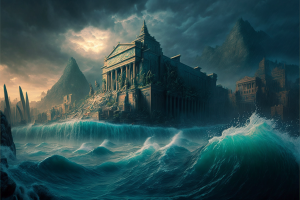Flood of Aturyanda
Dated by Kalaman Chronologers to 11,773 years before Salmakhamer, the Great Flood or Flood of Aturyanda engulfed the coastal regions of the globe and is attested by similar legends in Sungotine and New World cultures. Magdeologers believe that Sea Level was about two gnödva (30 meters / 100 feet) lower prior to the ancient Flood of Aturyanda.
Magdeologers believe the waters of the Great Flood caused the former basins of the Memnosian Sea, the Titans Sea, the West Turtle Sea, and the Keolamattu Sea, and their associated inland seas to become deluged and thus incorporated into the worldwide ocean.
Legendary Origin
Kalaman legend ascribes the Great Flood to the final war between dragons and the gods in which the gods defeated the dragons, but the Jahambuttha was destroyed that caused water to fall from heaven for many days. The Flood is named after Aturyanda, the mythical antediluvian king of Kathyasundi who was a pivotal character of the Aturyandakumi. Scholars prefer the name Flood of Aturyanda to Great Flood as there have been many catastrophic floods since the times of the Dragon Ice.
High Shadevan Valley Drainage Theory
Some naturalists who study the Shadew River attribute the Canyon of the Shadew in Shaddago to the great waters that flowed through the river into the sea as a result of the Flood of Aturyanda. These naturalists believe a great inland sea covered the High Shadevan Plains but due to earth shifts from the destruction of the Jahambuttha, the resting place of this body of water was moved and it drained precipitously to the sea. Others posit that this catastrophic drainage took place more recently in the Flood of Karuthaya.
The lands that are now the Shadevan Delta were flooded and unlike the Jaggudorns to the north, began a process of slow subsidence combined with the erosion caused by the new course of the Shadew River.
See Also
| This article is a stub. It requires further development by the creator. |
